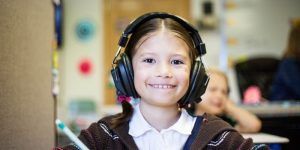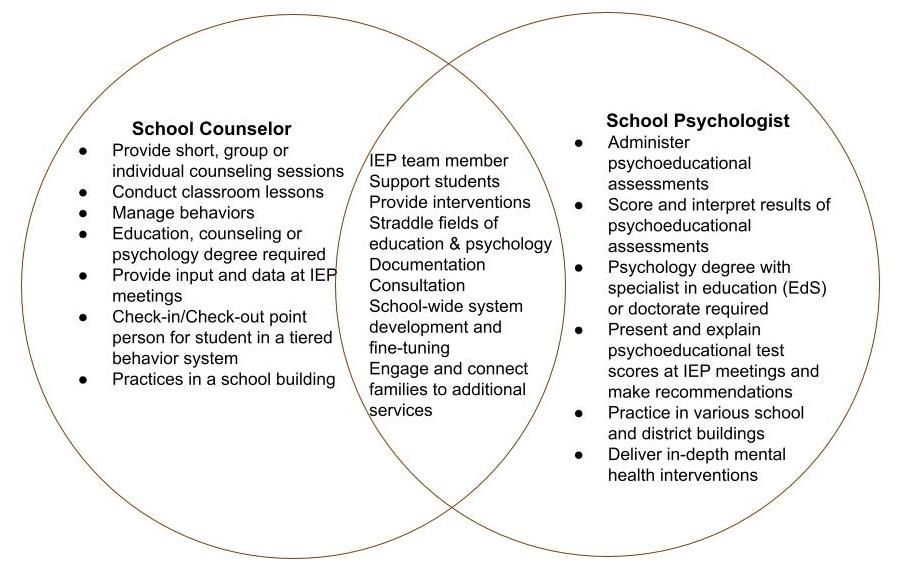

For many youngsters, school and life in general present an endless list of demands and challenges.
From trauma and learning disabilities to bullying and course selection, life can be difficult for students. A school counselor is there to help.
The basic role of a school counselor is to support students in their psychological, academic, and social development (Heled & Davidovitch, 2020; Popov & Spasenovic, 2020).
However, the breadth of school counseling is expansive. One minute, the school counselor may provide a social-emotional lesson to a first-grade class, and the next, they collaborate with the administrative team on a new school-wide behavioral intervention system.
Let’s look at this diverse role and what the ultimate aim is for all school counselors.
Before you continue, we thought you might like to download our three Positive Psychology Exercises for free. These science-based exercises will explore fundamental aspects of positive psychology including strengths, values, and self-compassion, and will give you the tools to enhance the wellbeing of your clients, students, or employees.
School counseling addresses issues that may affect students’ academic performance, which includes psychosocial and behavioral challenges (Gachenia & Mwenje, 2020). School counseling services are delivered by the school counselor.
A school counselor’s role addresses students’ mental, emotional, social, and academic development (Heled & Davidovitch, 2020; Popov & Spasenovic, 2020). Schools systems in different parts of the world have varying titles for school counselors (Popov & Spasenovic, 2020):
For more information on this important role in the United States, please refer to the American Counseling Association’s The Role of the School Counselor.
A 2020 study by Popov and Spasenovic showed that although the title or role of the school counselor differs somewhat, the key elements of school counseling can be summarized as:

“Advisor, advocate, agent, believer, collaborator, conductor, consultant, coordinator, diplomat, educator, enthusiast, expert, explorer, guide, initiator, leader, listener, mediator, mentor, navigator, negotiator, observer, pedagogue, professional, psychologist, researcher, specialist, supporter, teacher” (Popov & Spasenovic, 2020, p. 34).
These are just a few roles this multifunctional position may fill. It is important to note that the dominant functions of school counseling may also vary across countries. Let’s explore a few of these in depth.
Counselors help students identify their abilities, capacities, and interests, preventing dropout (Popov & Spasenovic, 2020).
The counselor may also act as a coordinator who advises students about their career orientation and decisions. In doing so, counselors may help students prepare for higher education and college admissions (Karunanayake, Chandrapala, & Vimukthi, 2020).
In Australia and Ireland, the role of the school counselor relies heavily on academic and career guidance and counseling (Popov & Spasenovic, 2020).
There can be many tricky situations within the school setting, and the counselor may act as an advocate who guides and negotiates by diplomatic means.
For example, a student may feel that they are being treated unfairly by their teacher. The counselor may also act as a mediator between students who have just had a physical altercation. Prevention is the focus for school counselors in Russia (Popov & Spasenovic, 2020), and a school counselor may be able to prevent unfavorable situations with pre-teaching social skills lessons and counseling.
In teaching social skills, a counselor can act as a researcher, specialist, expert, leader, and consultant (Karunanayake et al., 2020; Popov & Spasenovic, 2020).
The counselor must first seek a research-based social skills curriculum suited for their school demographic, deliver the content, and assist the general education teachers in utilizing the curriculum.
Sometimes all a student needs is a friend, and the school counselor can be there for the student in a professional capacity. With this professional friendship comes confidentiality and privacy.
Like a friend, the counselor may act as a mentor, supporter, advisor, listener, and believer.
Supporting students in their personal development and learning is the main role for school counselors in Denmark, Ireland, and the UK (Popov & Spasenovic, 2020).
In some schools, the counselor may be the frontline point person for students who misbehave. When a teacher sends a student out of the classroom, the student may be required to see the school counselor to address their behavior. The counselor may then decide on the next course of action or consult the administrators.
Counselors may also have to address attendance issues by communicating with students or parents (Karunanayake et al., 2020).

The Positive Psychology Toolkit© is a groundbreaking practitioner resource containing over 500 science-based exercises, activities, interventions, questionnaires, and assessments created by experts using the latest positive psychology research.
Updated monthly. 100% Science-based.
“The best positive psychology resource out there!”
— Emiliya Zhivotovskaya, Flourishing Center CEO
In many cases, the school counselor may act as a school psychologist while delivering counseling sessions. School counselors may sometimes have to address student trauma or remedy situations involving bullying.
In the United Kingdom, mental healthcare is also a big focus (Popov & Spasenovic, 2020).
School counselors may also be found in the classroom. They may assist the classroom teacher, provide consultation, or deliver lessons about social skills or emotional learning.
Just as the classroom teacher prepares lessons, the school counselor must also create and deliver engaging lessons while having good classroom management skills. Formatively assessing students’ knowledge during and after the lesson helps counselors to adjust the teaching or future content.
Collaborating with school staff and supporting the school organization and the teaching/learning process are also roles of the school counselor. The counselor must create and deliver a robust research-based school counseling program using data and student needs (Dimmitt & Zyromski, 2020).
Improving the overall functioning of the school, teaching, and school work is the main focus for school counseling in Croatia, Slovenia, and Serbia (Popov & Spasenovic, 2020).

Enhance wellbeing with these free, science-based exercises that draw on the latest insights from positive psychology.
Download PDF
By filling out your name and email address below.
The roles of the school counselor and school psychologist are similar in that they aim to provide all students with meaningful access to the school curriculum. The biggest differences between these two professions could be the preparation/education and licensing.
Although both roles may differ between countries, states, or school districts, here are a few of the common similarities and differences.
A school psychologist is tasked with the responsibility of helping students succeed academically, socially, and emotionally. This differs from the role of a school counselor in terms of their daily tasks and scope of support.
Regarding interventions, as an example, a school counselor may be responsible for the implementation of interventions, while the school psychologist’s duty includes administering, scoring, and interpreting psychoeducational assessments that help students qualify for specific services such as special education.
A school counselor is not licensed to perform such activities. In the United States, the Individuals with Disabilities Education Act mandates that a school psychologist is required as an individualized education program (IEP) team member to interpret the instructional implications of evaluation results.
Watkins, Crosby, and Pearson (2001) found that many psychologists would prefer to administer fewer assessments and instead conduct more activities that mirror the school counselor’s role. Indeed, in addition to psychometrics, many school psychologists work with students and the school in the areas of positive behavior or conflict-resolution and bullying (National Association of School Psychologists, n.d.).
As much as a school psychologist may wish to spend more time directly with students, the school counselor will likely be providing individual, small group, class, and counseling sessions to students. In such instances, students are more likely to be referred to school psychologists only when in-depth mental health interventions are required (Wake Forest University, n.d.).
Both school psychologists and counselors may provide training to teachers to help them meet students’ diverse needs and engage with families, helping to connect them to community service providers or other crisis prevention and intervention services.
The graph below is by no means an exhaustive list, but demonstrates some of the differences and similarities between school counselors and school psychologists.

In collaboration with the general education teacher, the school counselor may be able to suggest strategies, implement interventions, or start the special education referral process.
A school counselor may create a “buddy” program that pairs a returning student with a new student to make them feel welcome. Additionally, a school counselor may prepare a student for a post-high school job, technical school, or college.
A counselor is there to help students through difficult situations both in and outside school.
In sum, by addressing these goals, a school counseling program aims to improve students’ academic performance and social skills (Gachenia & Mwenje, 2020).

School counseling is both a complex and delicate service within the school setting.
As a school counselor, it is important to be aware of legal and ethical ramifications of your actions (Herlihy, Gray, & McCollum, 2002).
For example, imagine a student confides that they thinking about hurting themselves. They urge you to promise not to tell anyone. While you want to practice confidentiality, ethical guidelines steer you in a different direction. Here are a few important points:
Duty of care must be taken into consideration, and the counselor will need to notify the appropriate authority if a student is being harmed or plans to do harm (American Counseling Association, 2014; McGinnis & Jenkins, 2006).
A counselor must not enter a nonprofessional relationship with a student or former student (American Counseling Association, 2014). Boundary Issues in Counseling: Multiple Roles and Responsibilities by Herlihy and Corey (2014) is an extremely good book to explore many ethical situations and solutions.